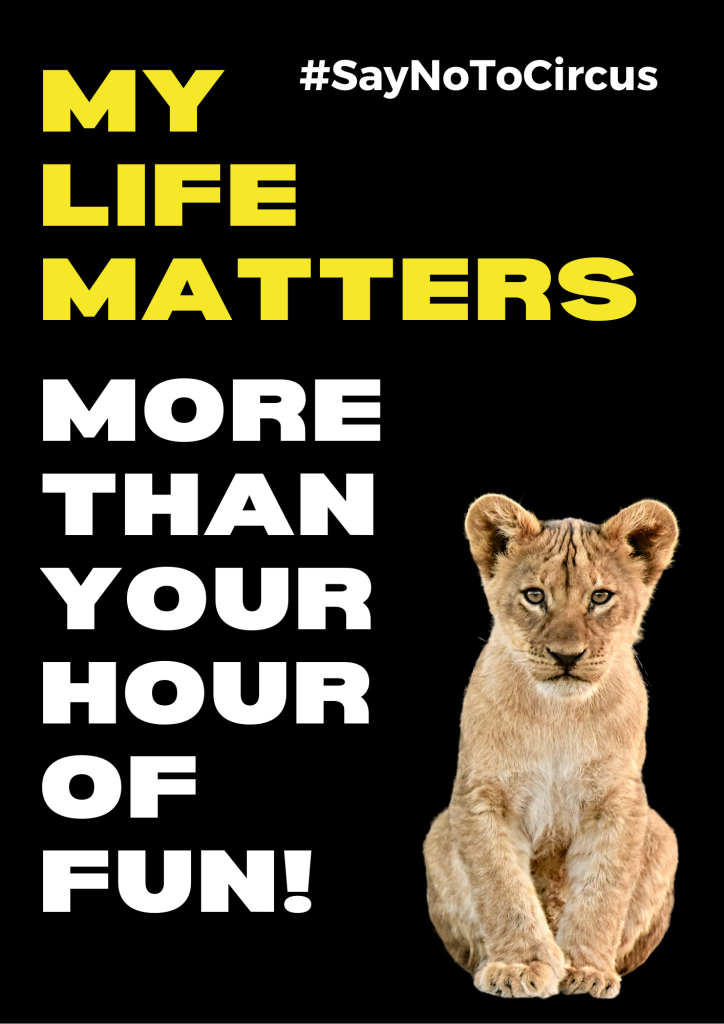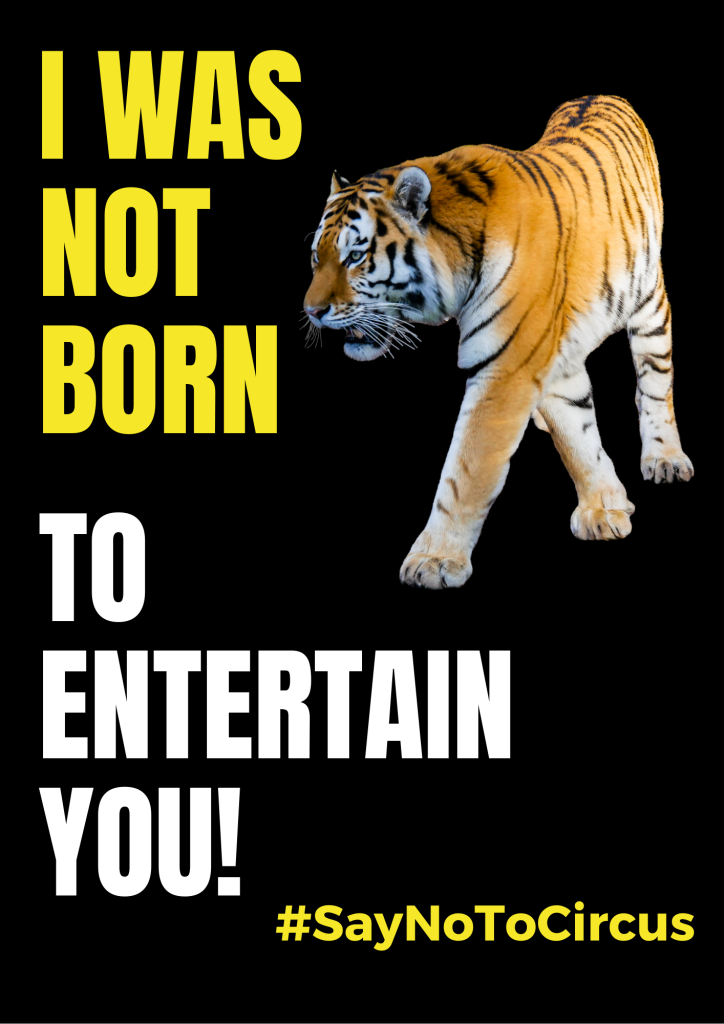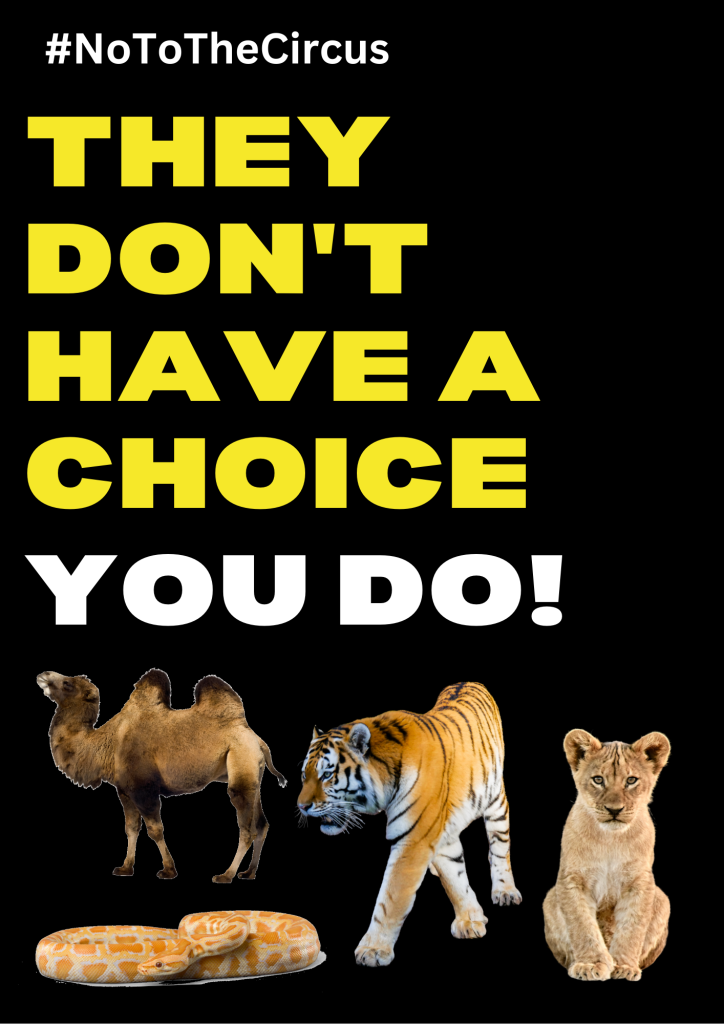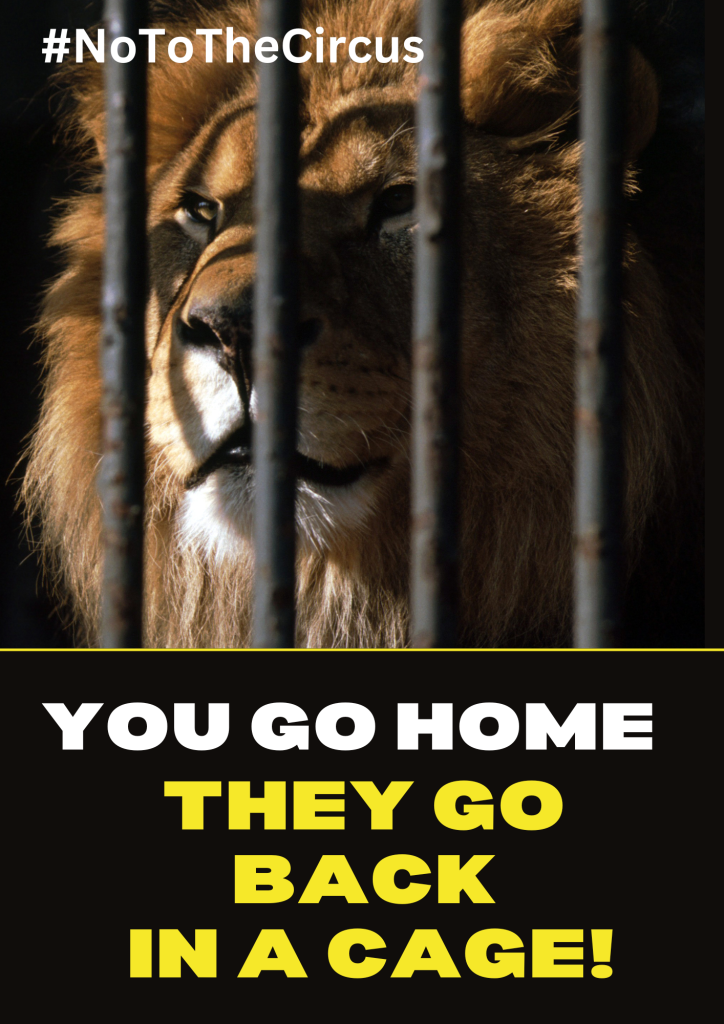
WHY YOU SHOULDN’T SUPPORT THE CIRCUS AND WHAT YOU ARE TEACHING YOUR KIDS IF YOU DO.
The circus has long been a source of entertainment for families around the world, promising a magical experience filled with wonder and excitement. However, beneath the colourful facade and dazzling performances lies a troubling reality that has sparked growing concerns over the years. This article aims to shed light on why parents should consider alternatives to traditional circuses, with a particular focus on the ethical issues surrounding the exploitation of animals for human entertainment.
As society becomes increasingly aware of animal welfare issues, public opinion has shifted away from supporting circuses that use animals. Many countries and cities have implemented bans or restrictions on the use of animals in circuses in response to these concerns. By attending such circuses, parents inadvertently support practices that are widely seen as outdated and unethical.
People tend to not think about the “behind the scenes” and the welfare aspect of the animals when they go to enjoy the circus. No matter what the owners tell you and whether you think they are pampered or not, ANIMALS DO NOT BELONG IN THE CIRCUS. I wouldn’t trust anything from someone who thinks it is acceptable to exploit animals anyway. It is what you can’t see that is the problem!

REASONS TO NOT SUPPORT THE CIRCUS!
BORN IN CAPTIVITY & LACK OF OPPORTUNITY FOR NATURAL BEHAVIOUR.
One of the most distressing ethical concerns surrounding animals in circuses is the lack of freedom to exhibit natural behaviours and forcing them to do unnatural tricks. Wild animals, such as elephants, big cats, and bears, have evolved over millennia to thrive in their natural environments, engaging in activities like roaming vast territories, hunting, socializing, and caring for their young. In the circus, these fundamental behaviours are stifled, as animals are downgraded to confined spaces and compelled to perform unnatural tricks. This not only leads to physical and psychological distress but also fundamentally deprives these creatures of the right to be themselves.
Elephants, lions, tigers, and chimpanzees for example, naturally social creatures, suffer in circuses where they’re separated from their mothers at a young age and isolated from their natural behaviours and environment. These performances force them into unnatural acts, like tigers leaping through fire or elephants balancing on their heads. The circus takes these animals far from their natural habitats and disrupts their social structures, resulting in behavioural and health issues stemming from the captivity they endure.
These animals, of which many are inherently wild, deserve to live in their natural habitats, and not be forced to entertain audiences with unnatural behaviour to make money for the owners.
TRAVEL, CHAINED & CAGED WITH LITTLE SPACE
While on the road, circus animals endure harsh conditions, often crammed into filthy, sweltering, and poorly ventilated tractor trailers. In one of these trucks, an elephant named Heather tragically succumbed to heat exhaustion. Outside of training and performances, these animals spend most of their lives confined in chains or small cages. Circus animals, during the average 48-week circus tour, have limited space, just enough to stand and turn around. This starkly contrasts with their wild counterparts, such as elephants that roam up to 195 km per day, underscoring the stark difference between their cruel circus life and their natural habitat.
This constant travel can have severe physical and psychological effects on the animals. They are frequently confined to small cages or trailers for extended periods, leading to muscle atrophy, joint problems, and stress-related health issues. Additionally, the long journeys between performances can disrupt their natural sleep patterns and routines, further exacerbating their stress and discomfort.
For parents concerned about the well-being of animals, recognizing the toll that this nomadic lifestyle takes on them should be an additional reason to avoid circuses that use animals.
MENTAL HEALTH & PHYSICAL LONG-TERM DISABILITIES
Wild animals in circuses endure extreme stress due to the disruptive circus environment, including blaring music, cheering crowds, and disorienting lights. They suffer through transportation, training, and performances in cramped spaces, leading to stress-related illnesses, depression, anxiety, and frustration stemming from unnatural behaviours and social isolation. These prolonged conditions can result in abnormal behaviours like swaying, head-bobbing, and incessant pacing, sometimes even self-harm. Circus animals are denied essential elements of their lives, such as running, playing, and socializing without a schedule to perform. In moments of overwhelming stress, some have been known to go on rampages, causing property damage, injuries, and even deaths, with the animals often paying the ultimate price.
The sensory overload in circus environments, including blaring music, flashing lights, and overwhelming smells, can have a profoundly distressing impact on the animals involved, whether you are used to it or not. These heightened sensory stimuli can induce stress and anxiety. The constant exposure to unnatural scents, such as paint, food, and fuel, can overwhelm their highly sensitive senses, further contributing to their discomfort and disorientation.
For parents concerned about the well-being of animals, the harsh sensory environment of circuses serves as another compelling reason to choose alternative, animal-free entertainment options that prioritize the mental and emotional health of these animals.
In addition to the above, the captive state that these poor animals experience, often leads to shorter lifespans and physical disabilities, due to a lack of any natural exercise and the extreme daily confinement. Joint problems are particularly common among elephants, lions, and tigers as they would naturally roam over distances, something that circus animals never get to experience.
THE DARK SIDE OF TRAINING
Circus animals’ training is often misrepresented, creating a false image that they perform willingly. Behind closed doors, investigators have documented trainers’ use of brutal tools like bullhooks, whips, and electric prods, causing injuries such as bleeding, bruising, and broken bones. Are you so naïve to think that these animals do unnatural tricks because you ask nicely? Some of these circuses often refuse voluntary entry of animals welfare authorities and have had multiple warnings given about the conditions the animals are in. Why would you do this if you have nothing to hide? Why would you need to be told how to take better care of animals, if you are in this industry for so long?
Read more on how cruelty comes in many forms.

THE CIRCUS IS NOT EDUCATIONAL
Some argue that animals in entertainment can serve as educational tools, raising awareness about different species and their conservation needs. However, this argument is contentious, as it raises questions about whether animals’ educational value justifies their captivity and potential suffering. A three-year-old can tell you a lot about a dinosaur that they have never seen in real life. I believe that education can be achieved without subjecting animals to stressful or unnatural conditions and that focusing on their conservation in the wild is more effective.
The circus perpetuates harmful stereotypes and misconceptions about these creatures, their behaviour and conservation, reinforcing the idea that animals exist for human amusement and can be used as commodities.
When a school except these free or discounted tickets, I seriously question if they are what is good for shaping my child.
Read more on why you should not support any circus that uses animals for entertainment and why these animals are prisoners for profit in the entertainment industry being exploited for human entertainment.
WHAT ARE YOU TEACHING YOUR CHILDREN WHEN YOU SUPPORT THESE EXPLOITIVE INDUSTRIES?
The decision to support or reject the use of animals for entertainment holds significant implications for the lessons we impart to our children. By choosing to support animal entertainment, we risk reinforcing notions of animals as mere commodities, potentially stifling empathy, and disconnecting them from the natural world. Such a stance can normalize the exploitation of sentient beings for amusement, teaching children that this is an acceptable part of human interaction with animals. It’s important to consider both the intended and unintended lessons they might learn.
Here are some potential lessons that supporting such practices might teach your child:
Animals as Commodities: Supporting animal entertainment can inadvertently teach children that animals are objects to be used for human enjoyment rather than sentient beings with their own needs, emotions, and rights.
Lack of Empathy & Compassion: Children may not develop a strong sense of empathy towards animals if they see them being treated as props or performers rather than beings deserving of respect and care. Parents who take their children to such circuses inadvertently endorse the suppression of natural behaviours, undermining the principles of compassion and respect for all living beings.
Disconnection from Nature: Encouraging entertainment that exploits animals might distance children from the understanding that animals are part of the natural world and ecosystems, contributing to a lack of appreciation for biodiversity and the environment. By opting for animal-free entertainment options that allow animals to live in environments that mimic their natural habitats, parents can demonstrate a commitment to preserving the dignity and inherent rights of these magnificent creatures.
Normalization of Exploitation: Children might come to see the exploitation of animals as a normal and acceptable part of human entertainment, potentially perpetuating a cycle of unethical treatment in the future.
Misunderstanding Animal Behaviour: Entertainment routines often involve animals performing behaviours that are unnatural to them. This can lead to misconceptions about animal behaviour and perpetuate stereotypes that don’t align with the animals’ true nature.
The decision to reject animal entertainment can be an opportunity to teach children about ethical considerations, critical thinking, and making informed choices based on principles and values. Ultimately, the messages you convey to your child about animal entertainment will shape their attitudes and beliefs about animals, their role in the world, and their responsibility toward them. Choosing to support ethical forms of entertainment or activities that prioritize the well-being of animals can help children develop empathy, compassion, and a deep respect for all living beings, their rights, and their dignity. The path we choose reflects our collective responsibility to nurture not only the well-being of animals but also the values we hope to pass down to the generations that follow.

WHAT CAN YOU DO?
Parents who are genuinely interested in educating their children about the importance of caring for animals and wildlife conservation should seek out alternative educational opportunities where what is best for the animals are the top priority. Human interaction with them, is never what is best for them!
There are so many entertaining circuses that don’t exploit animals, but use true human talents. Support them! Join a demonstration and encourage your friends and family members to shun animal circuses by sharing this information. Be an example for your kids.
In conclusion, while the circus may offer a tempting escape into a world of wonder and awe, it’s essential for parents to consider the ethical implications of their choices. The use of animals in circuses raises significant concerns about exploitation, safety, education, and changing societal values. By opting for alternative and ethical forms of entertainment and educational experiences that do not involve animal exploitation, parents can send a powerful message about the importance of compassion, empathy, and ethical responsibility to their children. In doing so, they contribute to a brighter future for both animals and the generations to come.
WATCH this short video on the sad reality of animals in captivity. Do you remember how you felt during lockdown? This is their life.

Your hour of fun means a lifetime of enslavement for them. Entertainment should not come at the expense of the well-being of animals and people alike. Instead, parents can choose to support circuses and entertainment options that prioritize human talent and creativity over the use and exploitation of animals.
Taking your kids to the circus is not “just for fun or innocent”, it shows a lack of compassion and understanding. When you go home, they go back into a cage and you paid for it. Captivity is not education…..don’t be captured by it.
We will fight, not until cages are comfortable, but until they are empty! Thank you to each responsible, intelligent and compassionate parents who SAY NO TO THE CIRUCS!
Next week we will look at protecting your pets from the heat.
WHEN YOU KNOW BETTER, DO BETTER!